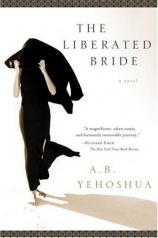Excerpt
Excerpt
The Liberated Bride

A Village Wedding
HAD HE KNOWN that on this evening, on the hill where the village held its celebrations, an evening suffused by the scent of a fig tree bent over the table like another, venerable guest, he would again be struck-but powerfully-by a sense of failure and missed opportunity, he might have more decisively made his excuses to Samaher, his annoyingly ambitious M.A. student, who, not content with sending him an invitation by mail and then repeating it to his face, had gone and chartered a minibus, after first urging the new department head to make sure the faculty attended her wedding. It wasn't just for her sake, she said. It would be a gesture to all the university's Arab students, without whom-the cheek of it!-the department would count for nothing.
His wife, Hagit, who knew all too well how weddings had depressed him in recent years, had warned against it. "Why do you need the aggravation?" she had asked. "But they're Arabs," he'd answered mildly, with the innocence of a man pursuing an academic interest. "As opposed to what?" she had wanted to know. "Human beings?" "On the contrary...on the contrary..." he had tried defending himself, at a loss to explain how Arabs, although not among the many objects of his envy, could be more human than anyone else.
Yet the snake of envy, his companion of many years, had slithered after him here too, to the little village of Mansura high up in the Galilee, near the Lebanese border. It had lain coiled in the incense of the glowing grilled lamb and writhed to the Oriental music that, despite its sobbing grace notes, secretly aspired to the savage disco beat of a Jewish wedding party-and now, as the student bride presented him not with the seminar paper she was a year late in finishing, but with her groom, it injected its venom.
Many hands had done their best to beautify Samaher, causing him to wonder for a moment whether he was looking at the same woman who had taken nearly all of his courses for the past five years. High heels and a swept-up hairdo had made her taller, and her usually restless eyes, chronically resentful when not anxiously scheming-the eyes of an active member of the Arab Student Committee-were smiling and relaxed. She was also without her glasses, and her eyes were heavily made up with a kohl so unusually tinted that he suspected it of having been smuggled across the border from Lebanon. A bright rouge masked the pimples that wandered as a rule from her cheeks to her throat and back again, and her long wedding gown bestowed a harmony, if only for a single night, on a figure not known for its sartorial coordination. Brimming with pride at having enticed him, the most senior and eminent of her teachers, to honor her and all Araby with his presence, she extended a hand quivering with excitement to his wife.
"So this is the teacher who's so annoyed at you," laughed the groom, pumping his hand in what could have been either an acknowledgment of Samaher's flightiness or a warning that she now had a protector. It was the same young man-taken by Rivlin for a maintenance worker rather than a future husband-who had stood every day last winter in the corridor outside the classroom waiting for their seminar to end. As if to atone for an error of which he alone was aware, he rose from his seat and congratulated the new husband cordially. Yet even as he did so, the cruel fate of his son, the young husband rebuffed, stung him sharply. So strong was the surge of resentment and jealousy that he at once sought out his wife-who, however, was laughing gaily at some remark. Such sentiments, although by rights she should have shared them, were unknown to her. Her glance, when he finally caught it, conveyed not so much sympathy as vague reassurance, plus a warning that he had better not get into one of his bad moods among all these people trying so hard to be hospitable.
It was being slowly spun out, Samaher's wedding, on the twilight of a bashful summer night, to the friendly warmth of young Arabs, many of them students from his and other departments at the university, who had gathered in their little autonomous kingdom, the borders of which were being drawn, stealthily but steadily, amid the pinkening hills of the Galilee. Now, telling a bearded young qadi in a gray cloak that she didn't want her Jewish guests to feel deprived, the bride asked him to repeat a shortened version of the wedding ceremony-which, they were surprised to hear, had already taken place in the bosom of her family a few days previously. It was an opportunity to still the wailing music, leaving the hill so shrouded in silence that the distant boom of an artillery shell fired across the border in Lebanon sounded like part of the reenacted rite.
Excerpted from The Liberated Bride © Copyright 2004 by A. B. Yehoshua. Reprinted with permission by Harvest Books, an imprint of Harcourt Trade Publishers.
The Liberated Bride
- paperback: 576 pages
- Publisher: Mariner Books
- ISBN-10: 0156030160
- ISBN-13: 9780156030168

